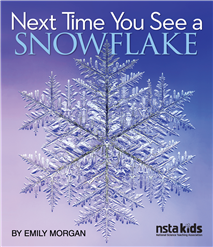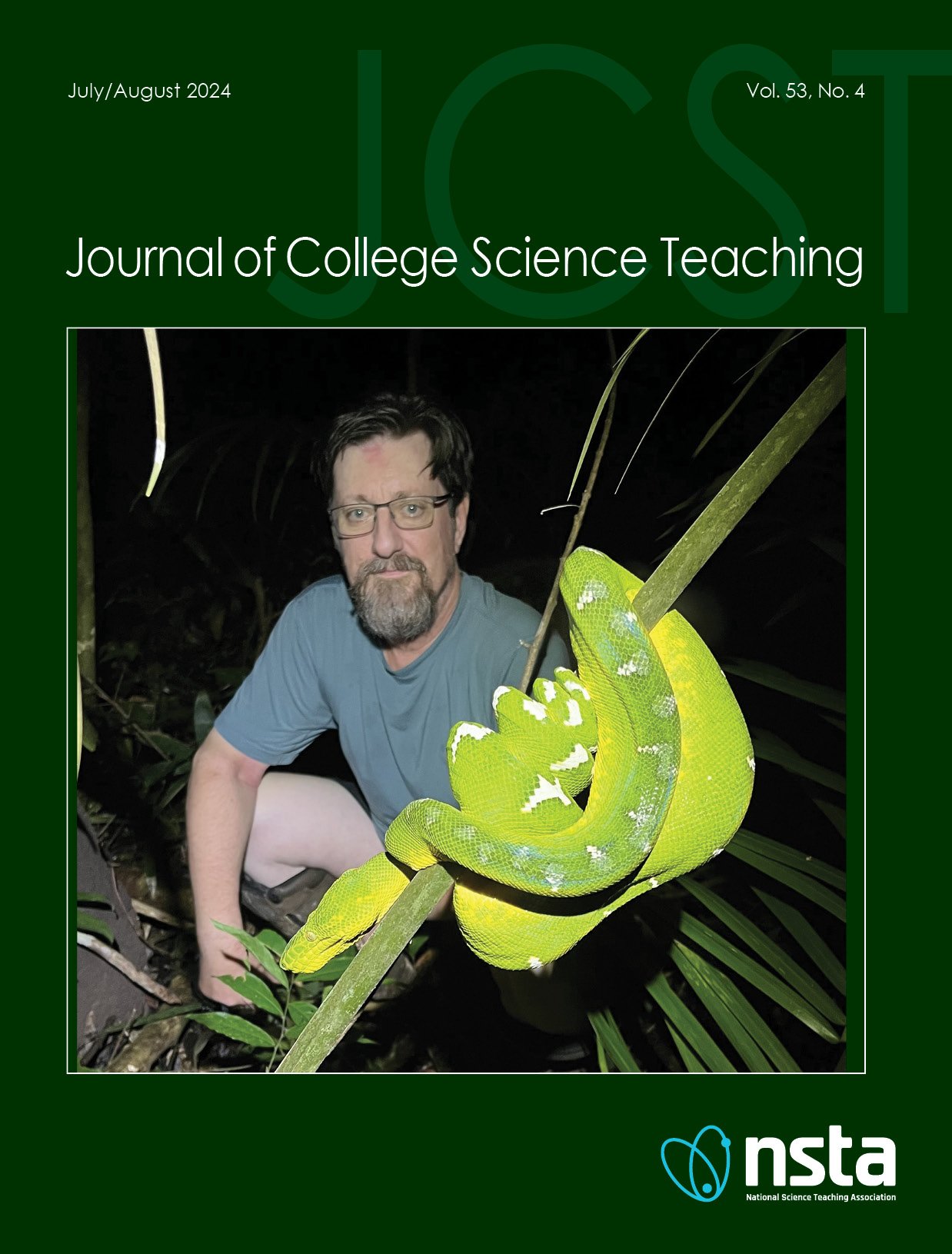All Resources
Journal Article
One of the most cost-effective ways to engage students in real-world STEM is by turning to local issues of emerging relevance through current events. In this middle school lesson, local current STEM events are used to encourage students to explore th...
By Rebecca Grella
Journal Article
Flipped Science Classrooms and the Cornell Note-Taking Method
The flipped classroom is a relatively new innovation in teaching middle school science; however, students often struggle with taking notes that provide metacognitive cues and reinforce understanding. This paper describes the structure of a flipped mi...
By Edward Miller, Angela Kelly
Journal Article
Many young people learn about scientific topics online, yet middle school students have trouble identifying where scientific information comes from and what characterizes good sources of scientific information online. In this article, we discuss five...
By Sara Montgomery, Angela Kohnen, Christine Wusylko
NSTA Kids
Click here to view video of Next Time You See a Snowflake This book will have you seeing snowflakes in a whole new way. You’ll learn about the science of snowflakes – how they form, why they are six-sided, what conditions are necessary for the...
NSTA Kids
Next Time You See a Snowflake (Hardcover)
Click here to view video of Next Time You See a Snowflake This book will have you seeing snowflakes in a whole new way. You’ll learn about the science of snowflakes – how they form, why they are six-sided, what conditions are necessary for the...
Web Seminar
Join us on Thursday, November 21, 2024, from 7:00 PM to 8:00 PM ET, to learn about NSTA'...
Web Seminar
This interactive web seminar will begin with an overview of safety protocols specific for doing secondary-level safer science/STEM laboratory activities. The presenters will be Dr. Ken Roy, NSTA and NSELA Safety Compliance Advisor/Specialist and Dire...
Web Seminar
This interactive web seminar will begin with an overview of safety protocols specific for doing elementary level safer science/STEM classroom/laboratory activities with Dr. Ken Roy, NSTA and NSELA Safety Compliance Advisor/specialist and, Director of...
Web Seminar
In this web seminar, a panel of early childhood science teacher educators/researchers will define high quality early childhood science education, elicit challenges from participants, and present current research in addressing these challenges. This ...
Journal Article
Right to the Source...
By Kelsey Beeghly
Journal Article
Teaching Physics as the Awesome Rules of Nature
Focus on Physics...
By Paul G. Hewitt
Journal Article
Equitable Science for a Socially Just Classroom
Editor's Corner September/October 2024...
By Brooke Whitworth
Journal Article
Finding Instructional Resources for Teaching about Scientific Misinformation
A classroom guide to resources about misinformation...
By Andy Zucker
Journal Article
Reimagining Science as a Natural Tool for Connection: A Restorative Approach
This paper explores a restorative-type intervention with a high school student who is suspended from school for repeated threats to other students. Throughout the paper, we explore the use of restorative practices in the context of science teaching. ...
By Zachary Schafer
Journal Article
“Black is Beautiful”: A Culturally Relevant/Responsive High School Biology Lesson
This biology lesson uses the science of central dogma to “critique and question the politics of representation that systematically devalue[s] Blackness” (hooks, 1995, p.131). Students’ understanding of protein synthesis is extended in discussin...
By Eddie Taylor
Journal Article
Making chemistry relevant to Indigenous Peoples: An Inuit case study
The ability of our northern Indigenous peoples (Inuit, Iñupiaq, and Yupik) to survive and thrive in the Arctic depends significantly upon underlying chemistry and chemical principles. Here, we explore four of these connections, then show how the Ind...
By Chaim Andersen, Rosalina Naqitarvik, Jennifer Winters, Erica Taylor, Geoffrey Rayner-Canham
Journal Article
Science classrooms are most engaging when students have the opportunity to engage in the practices of scientists. Unfortunately, many attempts to incorporate science into the classroom are disconnected from real scientific practice. When classroom sc...
By Ari Geary-Teeter, Thomas McKenna
Journal Article
Researchers have long called for integrating socio-scientific issues (SSIs) in science instruction, recognizing the importance of connecting science learning with societal challenges. Our proposed three-day unit design addresses SSIs in secondary sch...
By Mutiara Syifa, Fuyi Feng, Chia-Hsin Yin, Lin Ding
Journal Article
Cultivating Teachers’ Indigenous Knowledge through Explorations of Milkweed and Phenology
Providing more equitable pedagogies to all students, including those who are traditionally underrepresented, is a high priority of science education. In this paper, we outline how we coupled Indigenous Ways of Knowing with investigations about plant ...
By Hillary Barron, Emily Mohl, Michele Koomen
Journal Article
Determining the Relative Mass Between the Nucleus and Electrons Modeling Lab
Freshman general science students already know the atom is composed of a nucleus containing protons and neutrons with electron circling the nucleus. This hands-on modeling lab allows students to visualize and discover the electrons mass is far less a...
By Gary Schlitz
Journal Article
Students with Visual Impairments can be Successful in Science
One of the goals of the Next Generation Science Standards is to make science accessible to all students, which includes students with disabilities such as blindness and visual impairments (BVI). However, educators of students with BVI have limited ex...
By Rhea Miles
Journal Article
All students should have opportunities to investigate issues related to their personal interests and community priorities. Teachers value these goals but often lack materials that follow students' meaningful questions about phenomena while meeting st...
By William Penuel, Kate Henson, Zoë Bracey, Nicole Vick, Ann Rivet
Lesson Plan
Journal Article
Uncovering Earth’s History, One Sample at a Time
Teaching Through Trade Books...
By Christine Anne Royce
Journal Article
This paper discusses two teachers’ experiences implementing a phenomenon and problem-driven curriculum for the first time in two kindergarten classes. It describes how teachers shifted their teaching to support students’ collaborative sensemaking...
By Mary Short, Nancy Costanzo, Allison Fleming
Journal Article
Making Space for Local Science: Strategies for teachers to find and adapt phenomena in science units
This article discusses strategies for teachers to find and use local phenomena in designed science units. The Next Generation Science Standards promote grounding learning in observable phenomena that students investigate using science practices. Howe...
By Katahdin A Whitt, Becky Hallowell
Journal Article
Dog Days At School: Using Authenticity to Guide cross-curricular Learning in Kindergarten
The presented unit explores the often-overlooked potential of integrating science, social studies, math, and ELA through the lens of a kindergarten unit centered around the creation of a dog park. Emphasizing collaborative decision-making and communi...
By Amanda Sanderman, Chelsie Byram
Journal Article
Learning to be an Ambitious Science Teacher
Since the release of the Next Generation Science Standards (NGSS), students are expected to learn science according to the three-dimensions (DCI, SEP, CCC). In order for teachers to support the three-dimensional learning of their students, they need ...
By Alex Gerber, Heather Milo
Journal Article
The emperor penguin is one of the most identifiable animals on earth. Its survival depends on a variety of factors, such as temperature and other environmental elements. In order to engage fifth-grade students in exploring the captivating phenomenon ...
By Robyn Yewell, Ron Gray
Journal Article
Mapping in Two and Three Dimensions
Second graders used their own school-ground explorations, using journals and iPads for pictures and narrated videos, to create traditional, two-dimensional models of their school-grounds and all its natural and human-made features. These data collect...
By Jeffery Townsend, Connie Hodge, Sonja Yow, Whitney Cox






